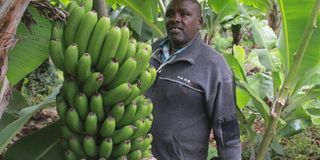Moles chewed up my Sh38,000 bananas

Paul Ruga in his banana farm in Gatero, Nyeri County after defeating moles. PHOTO | JOSEPH KANYI |
What you need to know:
- The moles, which multiplied fast in his farm, destroyed Paul Ruga's bananas worth about Sh40,000.
- Later, he learned from fellow farmers that use of pig manure can help stop the rodents.
Standing in his four-acre banana farm, where he has 308 plants, Paul Ruga has been a disturbed farmer.
The farmer, who grows tissue culture bananas in Nyeri, has been battling moles for several months.
The moles, which multiplied fast in his farm, destroyed his bananas worth about Sh40,000.
“I knew there was a problem late in 2012 when I saw small mounds of soil on my farm, but I did not give it much thought at first.”
Later while walking around his farm, Ruga realised the problem was bigger than he had thought after he saw several bananas were leaning towards the ground.
“After uprooting one of the bananas, I saw burrows made by the moles in the ground. I was enraged. After assessing the damage, I realised I had lost several stems of bananas which would have fetched me good money,” he tells Seeds of Gold.
Ruga bought rat poison, put at different places in the farm to kill the rodents.
“At first the moles ate the poison but after a while, the method failed. Moles are intelligent. They smelt the poison and avoided it and continued destroying my bananas.”
Desperate, Ruga turned to a certain firm that specialises in killing rodents and other pests.
He was paying Sh300 for each mole captured live. This technique, however, turned out to be expensive.
Later, he learned from fellow farmers that use of pig manure can help stop the rodents.
“I bought the manure from a farmer and started using it. I was overjoyed when I realised the moles had disappeared from my farm.”
MORE LIGHT
The farmer overcame the problem late last year after losing about 30 banana plants, which would fetch him about Sh38,000 per harvest. He applies the pig manure in liquid form at the base of the banana stems and the burrows where moles hide.
“The moles do not like the smell of pig manure. Although it does not kill the rodents, it repels them.”
And as he thought he had won the war against the rodents, his bananas were also attacked by Cigar End Rot disease this year. Cigar End Rot is a fungal disease caused by Verticillium theobromae and Trachysphaera fructigena. The pathogen normally attacks bananas through the flower causing a dry rot.
“I lost 17 banana plants to this disease, which would give me up to Sh20,000 per harvest.”
“I sought expert advice and was advised to prune the plants to expose them to more light,” adds the farmer who grows Grand-Nain, Williams, Uganda Green, Gikanda and Ng’ombe Nusu varieties.
Ruga is now back on track. In a month, he sells at least 56 bunches of bananas in Nairobi and Nyeri each weighing about 35kg. A kilo goes for Sh11.
KILL PESTS
He is the chairman of Nyeri County Bananas Farmers Cooperative Society Limited, started in 2012, and has 400 members.
Francis Wambugu, an agriculturalist with Dorkam Enterprises, which is under the Kenya Agricultural Productivity Agribusiness Project (KAPAP), notes that moles have affected many banana farmers in Nyeri County.
“The most recommended way to solve the problem permanently is by trapping the moles because you kill them leaving no survival chances,” says Wambugu.
“Most farmers complain that trapping is expensive, but it is the surest technique for now.”
While he has heard about farmers using pig manure as a repellent, he says the method is not yet scientifically proven.
“Proper farm management, particularly, pruning provides sufficient light for the bananas helping to kill vectors that transmit Cigar End Rot disease.” He advises that farmers must thus prune their bananas continuously.





